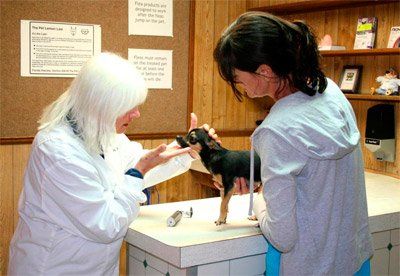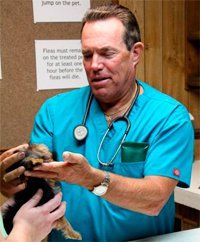Lisa Beitler, DVM
Mark Royer, DVM
Holly Bartels, DVM
Joey Durr, DVM
Heath Belk, DVM
Chris Kurtz, DVM
Gregory Strand, DVM
Vaccination series

Vaccinations against certain contagious diseases are one of the best investments you can make when it comes to the health of your dog. Puppies are not capable of developing long-lasting immunities, so this series of vaccinations provides overlapping immunity. Not administering all temporary vaccinations is dangerous because your puppy will be unprotected during its most vulnerable time.
General vaccination schedule
- 3-5 weeks of age – de-worm only
- 5-7 weeks of age – Parvo
- 7-10 weeks of age – five-way
- 10-13 weeks of age – nine-way
- 13-19 weeks of age – rabies and second nine-way
- Once each year – annual booster and license
Annual booster visits
We recommend yearly boosters for dogs after the schedules above have been met. Once each year, adult dogs should be brought to Scenic Hills Veterinary Hospital
for an annual check-up. At this annual visit, your dog will receive one or two shots – depending on whether the rabies vaccine is needed or not–There will be a hospital visit fee (office visit) which will help cover employee record keeping time, supplies, and needle/syringe disposal. An annual visit is required for refill of heartworm prevention and any other prescription items.
Parvo
Canine Parvo virus is an intestinal virus, similar to an extremely bad case of intestinal flu in humans. Without treatment, Parvo is often fatal, especially in dogs under 6 months of age. The initial series of vaccinations consists of four injections – see above vaccination schedule. The effectiveness of the Parvo vaccine has improved and is nearly 100-percent effective when given according to the schedule above. Keep reading below for more information about Parvo.

Influenza
Canine influenza is not a new virus. Since canine influenza is not a severe disease and has not been a major problem, we do not encourage vaccinations. The occurrence of canine influenza is sporadic, thus epidemics are unlikely. We do have the vaccine available primarily to use when a kennel requires it for boarding. The vaccine requires a two-shot series initially, and then an annual booster is recommended thereafter. If you have additional questions, please speak with one of our doctors.
Five-way
An injection that includes vaccine to give protection against distemper, hepatitis, Parvo, para-influenza and adenovirus cough (kennel cough). This injection must be followed by two nine-way vaccinations and a fourth Parvo vaccination in order to give adequate protection.
Nine-way
An injection that includes the five-way plus protection against four strains of leptospirosis, which are capable of causing kidney damage. This is the normal adult booster vaccination.
Rabies and Escambia County license
Rabies is a fatal disease that can be transmitted to humans by dogs, cats and some other animals. The rabies vaccination for dogs, cats and ferrets is safe and very effective. Escambia County requires all dogs, cats and ferrets to be immunized against rabies and receive a county license tag. The annual license fee goes directly to the Escambia County Animal Shelter and is used for animal control. State and county laws now recognize three-year rabies vaccine, but all three-year rabies vaccines require a two-shot series with a three-year vaccine to develop three-year protection. The initial rabies vaccination is still only effective for one year. Also, the county license is still valid for only one year. Next year, your dog, cat or ferret will still need a new county license to be legal.
Intestinal worms
Puppies should be de-wormed at 3 weeks of age, as they are more susceptible to worms than older dogs. They should be either checked for worms or, ideally, de-wormed every two to three weeks until they are 3 months old. Tapeworms, which are spread by fleas, are the only common intestinal worm of adult dogs and cats. Worm checks are no charge with vaccinations, exams or if a stool sample is brought to the hospital. We do not recommend routine monthly de-worming of adult pets.
We strongly urge that all dogs be checked for heartworms and started on heartworm preventative. The ideal age to start puppies on heartworm preventative is 3.5 months. Dogs older than 6 months must be tested before safely starting preventative medication. The blood test for heartworms takes only a few minutes and is included at no charge with our annual exams. Without early detection and treatment, heartworms are generally fatal. Please see our heartworm page for more detailed information.
A dog owner’s guide to parvovirus
Canine Parvovirus, which first appeared in 1978, is an intestinal virus similar to an extremely bad case of intestinal flu in humans. Like any virus, Parvo is a very small particle, smaller than bacteria. It infects the cells of puppies and young dogs. Without treatment, Parvo is often fatal, especially in dogs less than 6 months of age. While Parvo can be quickly diagnosed and successfully treated, there are other complications. Most puppies with Parvo have no immunities to other diseases, nor can they be vaccinated until they have sufficiently recovered. Often, these puppies will be exposed to Distemper. There is no accurate test available for Distemper in the incubation or early stages. The puppy that may have been successfully treated for Parvo cannot cope with a second deadly disease like Distemper. The probability of surviving concurrent bouts of Parvo and Distemper is nearly zero.

How can you tell if your puppy or dog has Parvo? The outward signs are lethargy and depression, followed by vomiting and diarrhea. The vomiting usually comes first and the feces are often bloody. The puppy/dog will refuse food and water, and will either run a fever or have a below-normal temperature. (A cold, wet nose is not an indicator of a dog’s body temperature. You must use a rectal thermometer for an accurate reading. A dog’s normal temperature is 102°F.) A puppy or dog with these symptoms should be taken to a veterinarian immediately.
Although there are no drugs to kill Parvovirus, veterinary treatment is essential for recovery. Blood and fecal tests are performed to accurately diagnose the disease. Parvo causes bleeding stomach and intestinal ulcers. Parvo can also affect the heart of very young puppies.
Our standard treatment for Parvo includes intravenous fluid therapy, antibiotics and blood transfusions. Until the disease runs its course, the puppy or dog will not be able to digest food properly. Intravenous fluids provide the pet with nourishment as well as combat dehydration. Antibiotics prevent secondary bacterial infections. Blood transfusions replace the blood lost from bleeding ulcers and also supply antibodies to help fight the virus.
Recovery takes up to a week or longer depending on the age and general health of the puppy or dog. Blood tests may be necessary during treatment to monitor progress. As the diarrhea comes to a halt and the puppy/dog begins to feel better, small amounts of water followed by bland foods will be introduced. Recovery is considered complete when the pet can properly digest its food and produces normal stools. Unfortunately, a few puppies and dogs can be so severely affected that they will not recover, despite proper treatment from a veterinarian.
Even when a puppy or dog survives Parvovirus, he may continue to spread the virus through his stools for up to a month. Parvo, like other viruses, lives in the environment for months and sometimes even years. Parvovirus on household and kennel surfaces can be destroyed using a solution of 1 ounce of chlorine bleach mixed with 1 quart of water.
The only way to protect your pet from infection or re-infection is with the Parvovirus vaccine. A puppy is best protected if his mother was vaccinated and he has received a COMPLETE series of vaccinations. Parvovirus inoculations begin at 5 weeks of age and continue every two to four weeks until the puppy is at least 16 weeks old. As an adult dog, your puppy should then receive annual booster vaccinations.
It is unusual, but not impossible, for a puppy to get Parvovirus after he has been vaccinated. Vaccine failures do occur, but not because the vaccine causes the disease. During the short period of time when the antibodies the puppy received from his mother has not yet disappeared, they can block the production of new antibodies. If the vaccinated puppy is exposed to Parvovirus during this critical period, he can become infected. The best way to avoid this scenario is to complete the entire series of puppy vaccinations without missing any or being late for any of the vaccinations.
If you decide to take in a stray, ask your veterinarian to estimate the dog’s age and vaccinate accordingly. When purchasing a dog from a kennel or shelter, be certain that disinfectants are used routinely and that all dogs are properly vaccinated.
A puppy in good general health will have the edge in surviving a Parvovirus infection – a fact you should consider when shopping for a new dog. Intestinal worms and fleas significantly lower a dog’s resistance to Parvovirus and lessen its ability to respond to vaccinations. Legally, a puppy cannot be sold until it is at least 8 weeks of age, has had its first two series of vaccinations and a health certificate stating these facts from a licensed veterinarian. After your pet survives puppyhood, the risk of a Parvovirus infection is very slight in a healthy, vaccinated adult dog.
